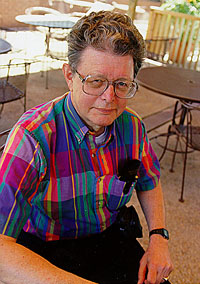
|
P
O U L
A
N D E R S O N : Fifty Years of Science Fiction (excerpted from Locus Magazine, April 1997) | |||
 Photo by Beth Gwinn other interview excerpts |
Poul Anderson's first story was published in 1947, when he was just 20 years old. Among his early novels are the sf Brain Wave and fantasy Three Hearts and Three Lions. Many of his later books can be grouped by sequence -- the "Technic History" series featuring the characters Nicholas van Rijn and Dominic Flandry; the "Time Patrol" time travel stories beginning with Guardians of Times. Notable singletons include the fantasy A Midsummer Tempest and the sf Tau Zero. His latest sf is the four-book sequence beginning with Harvest of Stars (1993). "What five books would I like to be remembered for? Well... Tau Zero, I like that one especially. It was somewhat of a tour de force, and I think it got across what I was trying for. Midsummer Tempest, certainly. And The Boat of a Million Years -- that's actually borderline between science fiction and fantasy. Three Hearts and Three Lions I have an affection for. For number five, I was hesitating over half a dozen, but The Enemy Stars will do. I wish I could get a really good single idea like that -- one you can run all over the field with, oftener. That is what science fiction does best. Brain Wave, old as it is, could be on that list too..." "My new, four-book series wasn't originally planned from beginning to end. I wrote the first book, Harvest of Stars, and as I was writing it, I saw that certain implications had barely been touched on... It's perfectly obvious that two completely revolutionary things are going on, with cybernetics, and biological science. In Harvest of Stars, there is this notion, not original with me of course, that it will become possible to download at least the basic aspects of a human personality into a machine program...." "...So much American science fiction is parochial -- not as true now as it was years ago, but the assumption is one culture in the future, more or less like ours, and with the same ideals, the same notions of how to do things, just bigger and flashier technology. Well, you know darn well it doesn't work that way..." "...As for the value of the individual, I'm quite consciously in the Heinleinian tradition there. ...It's partly an emotional matter, a libertarian predilection, a prejudice in favor of individual freedom, and partly an intellectual distrust based on looking at the historical record and considering the theory of it, including matters like chaos theory. A distrust of large, encompassing systems..."
"...My current project is science fiction, really ambitious I think. But again, it's a matter, to some extent, of what you can do, accepting limitations. Light-speed limitations again. Would a civilization, once it got started in that direction, keep on going indefinitely? What countervailing influences might there be, so that conceivably interstellar travel eventually dies out, even? ...The working title is Starfarers."
|
||
| © 1997 by Locus Publications. All rights reserved. |